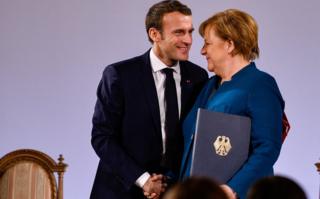Coronavirus: Why Merkel may help fund Europe's recovery plan
By Jenny Hill BBC Berlin correspondent Image copyright Getty Images
Image copyright Getty Images
Last year, in the sumptuous setting of Aachen's historic town hall, Angela Merkel and Emmanuel Macron signed a treaty. The leaders promised to co-operate more closely and to re-fire the political and economic heart of the EU, sealing the deal with a kiss for the cameras.
How times have changed.
Their attempts to jointly reform, reinvigorate and reinforce the EU against the deep currents of populism and the shock of the UK's departure have, thus far, not amounted to much; the German chancellor apparently reluctant to lend her weight to the French president's imagined agenda for Europe.
But last week they announced another Franco-German plan. There could be no public display of affection this time as, via separate video links, the leaders unveiled their economic recovery proposal for a corona-ravaged Europe. The EU Commission, they said, should borrow €500bn ($545bn; £448bn) from the financial markets to fund the venture.
Unable to stand physically shoulder to shoulder, Mr Macron and Mrs Merkel had, nonetheless, thrashed out a compromise that took many analysts by surprise - not least because it represents a significant shift in position on the part of the German chancellor.
How will it work?
The German leader has always resisted the mutualisation of EU debt.
The idea that richer member states should be responsible for the debts and defaults of poorer ones has not played well in Berlin, where the idea of "coronabonds", so vociferously demanded by a number of member states, had ministers spluttering into their coffee.
This proposal differs, but still centres on the sharing of debt.
The money, which will be doled out in the form of grants, will sit within - and be repaid out of - the EU budget, with each country shouldering the repayment proportionate to their existing contribution to the pot.
Germany as the biggest net contributor will therefore be liable to pay back more.
We say a clear Yes to corona emergency aid, but what we reject is a debt union through the back door
Not everyone is happy. Italy says the plan needs to be more ambitious, while four other countries, including Austria, want the aid to be in loans not grants.
The head of the European Commission, Ursula von der Leyen, will put forward the EU's own proposals on how the recovery fund and a revamped budget might work on Wednesday.
So why now?
Mrs Merkel's apparent change of heart is an indication of her alarm at where the EU might be headed, post-Brexit.
German politicians have been taken aback by the recent level of hostility coming out of Italy and they are spooked by the prospect of populists in Southern European states making gains on the back of the coronavirus crisis.
It was no accident that Mr Macron talked about learning the lessons of the financial crisis when he said Europe's response exacerbated inequality and damaged European sovereignty.
Mrs Merkel, edging towards the end of her final term next year, is looking to legacy and has made clear in recent speeches that she's focused on getting the bloc into shape.
Some say that a recent ruling of Germany's constitutional court may have spurred her on. The court has called into question the future of a huge European Central Bank bond-buying stimulus programme.
More on Europe's emergence from Covid-19 lockdown

She's also striking while the political iron is hot at home. Her handling of the pandemic has sent her own approval ratings soaring along with those of her party.
And, as Mrs Merkel is fond of repeating, "Germany only prospers when the EU prospers".
How are Germans reacting?
The Franco-German proposal has gone down well with the domestic audience. Public surveys suggest Germans have warmed to the idea.
It helps that, as the Berlin-based German Institute for Economic Research has noted in interviews, Germany wouldn't be directly responsible were another state to go bankrupt, and that this plan does not represent joint liability.
There's been remarkably little bite-back politically, with even her hawkish former finance minister, Wolfgang Schäuble reportedly giving the plan the thumbs-up.
Coronavirus has changed a great deal here, with politicians recently agreeing to abandon a long-cherished principal of not taking on new debt in order to finance a domestic economic rescue package.
Not that the fully developed plans won't be closely scrutinised. Katja Leikert, the deputy chair of Mrs Merkel's CDU-CSU parliamentary group, welcomed the initiative as "a significant political gesture to help rebuild political trust on the future of Europe".
But crucially, given that the money would be disbursed as grants to regions and industries deemed to be most affected by the crisis, Ms Leikert says that "conditionality will also be very important". She says, for example, that the fund should be used to "enable future investments... in digitalisation or transformation to a sustainable economy".
And while she notes that among voters she finds "huge support for European solutions in the time of the crisis", Ms Leikert adds that this is limited and says "we have to make sure that increased public spending on the European level will create a European added value".
Why a hard sell lies ahead
Europe's so-called "frugal four" continue to object to the plan, concerned that it might set a future precedent.
The leaders of Austria, Denmark, Sweden and the Netherlands may have heard Mrs Merkel say this was a one-off instrument for extraordinary times but, publicly at least, they don't believe her.
They'll be under huge pressure to fall in, now that the bloc's two weightiest members have agreed on a plan that co-ordinates beautifully - some would say suspiciously so - with the wishes of Ursula von der Leyen.
We need an emergency recovery fund to stimulate the recovery. We believe this should consist of loans, without any mutualisation of debts
It was no accident that, before Covid-19's deathly advance across the medieval courtyards and traffic-clogged avenues of Europe, Mrs Merkel and Mr Macron chose to hold that summit in Aachen.
Nearby, in its cathedral, lie the remains of the Charlemagne, the warrior king who first united - not always diplomatically - much of what we recognise as Europe today.
Having been apparently content to simply invoke an ancient ghost last year, it could be that finally France and Germany are together ready for action.
from BBC News
via PakapNews